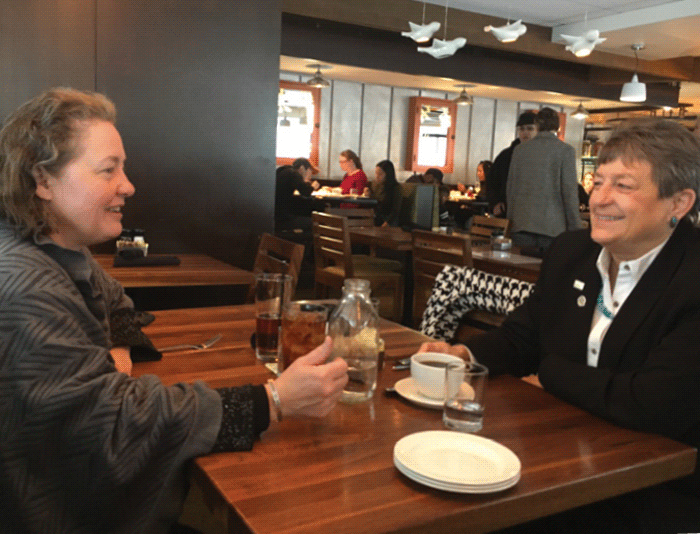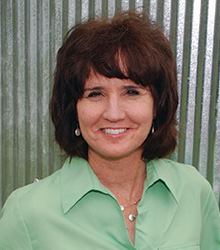Doris Mold
Dairy Farmer,
Sunrise Farm and Sunrise Agricultural Associates, Cumberland, Wis.
Jean Goslin
Cow-Calf Operator,
D Bar Ranch, Manhattan, Kan.
Pictured Above: Doris Mold (left) and Jean Goslin (right) face common challenges related to feed and staying vigilant regarding animal health. Consumer misconceptions related to food production is another challenge and these two producers also want truth in labeling. For instance, milk doesn’t come from a soybean and burgers aren’t made from vegetables.
Doris Mold: When it comes to caring for your animals, are you doing most of your vet work?
Jean Goslin: We have a vet within 15 miles who handles large animals. These kind of vets are getting harder to find because it’s less lucrative to be a large animal vet. It’s much easier to stay in the office and take care of cats and dogs. We work with our vet a lot and they are good with us calling about symptoms or guiding us in the direction we need to go. That saves us the cost of a trip. We calve in the fall, so every 1-2 hours I need to check them. Then, in the summertime, the biggest concern is probably the weather. With rain, it’s often either too much or not enough.
Mold: For us, because we’re pasture-based, we need to have enough rain. It seems like the faucet turns off conveniently at the beginning of July and won’t turn back on until fall. I’m the “maternity ward matron” on our farm, so I’m the one who is up at night as well. We calve year round. If we have animals that are calving or are near calving, I need to be diligent.
“I think dealers and service providers in general need to get a better attitude about the fact that women are farming and ranching. Not treat us like, ‘Oh you’re just the little woman.’ No, I’m a farmer or a rancher. I’m paying the bills and I deserve equal respect…”
– Doris Mold
Goslin: You try to do the best you can for your animals, but once in a while, something just sneaks up on you. We had anaplasmosis (yellow fever) a couple years ago for the first time, and it caught us off guard. We had two cows gone before we even knew what it was. How do you feel about the service industry as a whole for dairy farmers?
Mold: One thing that would be really handy is to have tractor/implement dealers come out for onsite servicing or repair. Obviously not to fully take your tractor apart, but come out and service some things. It’s hard to get the tractor loaded and bring it to the dealership.
I think dealers and service providers in general need to get a better attitude about the fact that women are farming and ranching. Not treat us like, “Oh you’re just the little woman.” No, I’m a farmer or a rancher. I’m paying the bills and I deserve equal respect. For people who do on-farm sales and don’t make an appointment, I tell them, “I’m happy to visit with you when you make an appointment, but this is my office. This is where I work. You need to be respectful of my time.” Those kinds of things concern me. Part of it is the lack of professionalism.
Goslin: For our operation, availability is increasingly scarce. Our co-op just merged with another one and so they’ve taken some services away and added others, so that’s kind of a challenge. Our feed now comes from about 50 miles away if you want it bagged.
Mold: Other challenges are related to regulations. For instance, it’s mandated by law for us to fill out the USDA census. That takes some work. There’s also the Food Safety Modernization Act, and I don’t think farmers and ranchers appreciate how that might impact their businesses. That not only applies to me as a dairy producer and the milk I produce, but also potentially the people providing my feed, like you, for example, as a hay producer.
Goslin: We’ve had the veterinary feed directive come out, and it has everybody stirred up a bit. There’s a particular chemical you put in to help keep flies off your cows, and now you have to have a veterinarian’s prescription to add that to your feed. The vet may not charge much, yet he still has to charge something to write a prescription for you to take to the feed mill.
I think it will be a while before the cow-calf operator has to worry too much about it, but I think it will start working into the feed yards quicker.
“Availability of services is becoming increasingly scarce…”
– Jean Goslin
Mold: How do you feel about genetics and technology when it comes to beef cattle as it compares to dairy?
Goslin: I think beef cattle are rapidly catching up to dairy on embryo transplants and that type of genetic work. I think we will see more and more selective breeding than what we’re doing now. On the technology side, I am concerned about what is called “meat.” If vegans want to have something come out of a petri dish, that’s fine, but don’t call it meat or beef or pork.
Mold: And that’s the beauty of the food system. In this country, people have an incredible amount of choice. I don’t want to deny people of their choice. Personally, I think milk is from a mammal and, obviously, as a dairy farmer, I think milk from dairy cows is superior to an almond beverage, soy beverage, or whatever. I’m not trying to insult people who raise soybeans or almonds, but that product shouldn’t be called milk.







